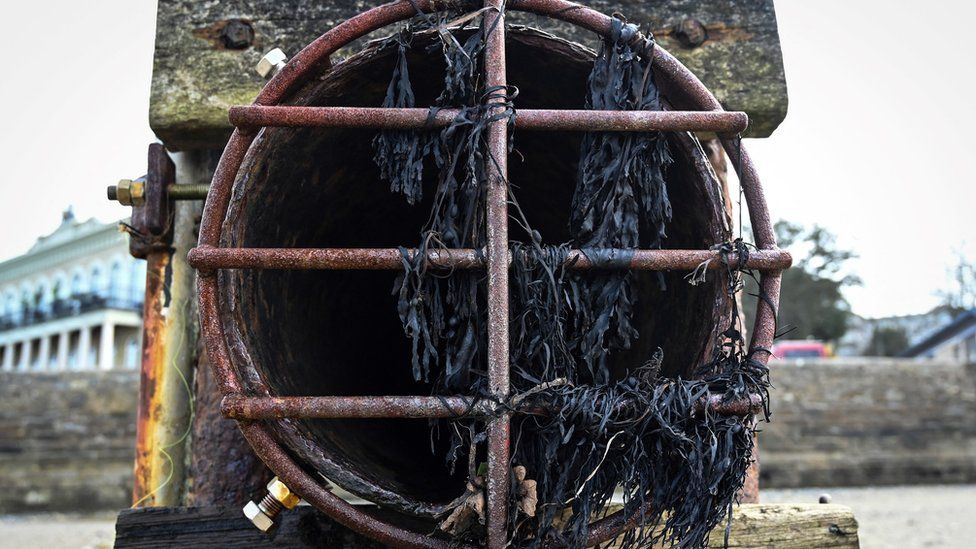ARTICLE AD BOX
 Image source, GLYN KIRK/AFP via Getty Images
Image source, GLYN KIRK/AFP via Getty Images
By Esme Stallard
Climate and science reporter, BBC News
Campaigners and opposition MPs have called for action on sewage spills, following a BBC News investigation.
It suggests three major water companies illegally discharged sewage hundreds of times in 2022 on dry days.
The practice, known as "dry spilling", is banned because it can lead to higher concentrations of sewage in waterways.
The Environment Agency (EA) said it was currently conducting its largest criminal investigation into "non-compliance" by water companies.
Water companies are allowed to release sewage after it has rained, to prevent it overwhelming the system and backing up into people's homes.
But BBC News cross-referenced 2022 spill data from Thames, Southern and Wessex Water with rainfall data, to identify 3,500 hours of potential dry spills - which are illegal.
On Tuesday, water campaigner and musician Feargal Sharkey said it "provides another layer of the horror that has become the water industry in England", while Labour called for an "immediate investigation into both the breach of the licence and the environmental damage caused".
This was echoed by Liberal Democrat environment spokesperson Tim Farron.
"These revelations are scandalous and the government must act immediately," he said.
"These companies should be held criminally responsible and see their day in court if found to be breaching their permits."
Budget cuts
Labour's shadow environment secretary, Steve Reed, blamed government underfunding of the EA.
"They cut back enforcement and monitoring against water companies releasing this filth and are now failing to prosecute them when they are blatantly breaking the law," he said.
The EA's environmental-protection budget, funded by the government's Department for Environment, Food and Rural Affairs (Defra), was halved between 2010 and 2020.
And one of its environmental-regulation officers told the BBC News investigation there was a "firm link" between budget cuts and staff losses and its failure to identify and investigate dry spills.
But in more recent years, the government has tried to reverse this trend, increasing the budget by 12% in the past year.
And Environment Secretary Therese Coffey told BBC News government work had revealed the potential dry spills.
"We've got the monitoring going - that's how we're able to uncover the scale of the issue that we're tackling," she told BBC One's Breakfast programme.
But the Rivers Trust charity said the BBC News investigation highlighted bigger problems with the whole sewerage system, of blockages, misconnections and broken pipes.
The government has promised £56bn of capital investments to improve the UK's ageing sewerage system, including tackling the issue of groundwater infiltration.
Wessex Water said groundwater entered the network through largely private pipes - not owned by water companies - which could lead to diluted spilling.
But Prof David Hall, at the University of Greenwich, questioned whether the problem could be solved while private companies owned the system.
"The privatised system is at the heart of these problems," he said.
"It provides a very successful commercial model for the companies, allowing their owners to make no investments but still take out dividends of £1-2bn every year."
'Greater transparency'
Nine companies handle sewage in England - but six did not provide their spill data to the BBC News investigation because industry regulator Ofwat and the EA were already investigating them for potential illegal spilling.
Jamie Woodward, professor of geography, at the University of Manchester, said this was unacceptable.
"Much greater transparency is needed across the water industry," he told BBC News.
"It's a scandal that water companies can deny environmental-information requests to hide important data on hazardous sewage dumps. Making these data available is clearly in the public interest."
In response to the BBC News findings:
- Thames Water said it regarded all spills as unacceptable and planned investment
- Wessex Water said the data it had provided was inaccurate and some spills were the result of groundwater, which dilutes any sewage
- Southern Water said dry spills were "a complex issue"

 1 year ago
50
1 year ago
50








 English (US) ·
English (US) ·